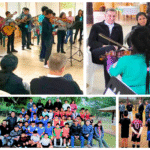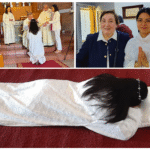
by f. Luis CASASUS, General Superior of the men’s branch of the Idente Missionaries.
New York, 07 June, 2020. | The Most Holy Trinity. Solemnity.
Book of Exodus 34: 4b-6.8-9; 2 Corinthians 13: 11-13; Saint John 3:16-18.
Sometimes I think I still have a long way to go before I fully understand and make good use of what our father Founder tells us about the purpose of our religious family of idente sisters and brothers: to live holiness in common.
But the truth is, the Founders are always ahead of us. When we share our spiritual life on the Examination of Perfection, the last point we manifest is the impression we receive from the three divine persons… and many of us miss the permanent reality and scope of these experiences.
Probably some of us consider this as a “summit” of the spiritual life, where only a few famous saints have reached. But the truth is that we all have some personal experience of the Father, the Son and the Holy Spirit. The opposite would be difficult to explain, for at least two reasons.
First, Christ promised that they would dwell in us: Jesus replied: If anyone loves me, they will obey me. Then my Father will love them, and we will come to them and live in them (Jn 14: 23). And secondly, because we were created in His image and likeness, which makes us naturally capable of having personal contact with the divine persons; it is as natural as a toddler wanting to embrace his mother or father.
Essentially, how do we have this contact with the divine persons? As an uncial impression (Uncial = to be anointed). according to Fernando Rielo’s expression. This means the impression of “being marked”, of coming out of that encounter with a mark (as a simile, think of a scar or a tattoo).
This impression means a fire mark, like the hot stamped one you put on cows, which is characterized by two things: it cannot be erased, it is indelible and it is also painful. The limp that affected Jacob after his fight with God during the night represents well that painful mark. Other examples, of course unusual, are the stigmata (or wounds) that some saints have had on their bodies. Although they are not necessarily signs of union with God, at times they accompany the spiritual process of true transverberation, the essential union of a soul with God.
Before explaining where this pain comes from, let us look at some examples of the encounter with the divine persons, of how they leave us anointed, that is, filled with their presence.
While Elijah hid himself in a cave, he did not heard God in the whirlwind or fire or earthquake. God’s voice was described as still and small. When John the Baptist proclaimed Jesus as Messiah and baptized Him, God’s voice called out from heaven and told everyone Jesus was His son with whom He was well pleased. God’s voice spoke words of encouragement and pride for His son. Later, when Jesus was on the mountain experiencing the Transfiguration God once again used His voice to tell the disciples to listen to His son and do what He says. God’s voice brings guidance, protection, confidence and most of all, it reminds us of his love.
The messages we receive from our heavenly Father typically have these contents:
– You are not alone. I know well the situation you are in.
– I trust you, that is why I allow you to be in such complicated circumstances and I entrusted you with a mission. You trust me.
– You have my forgiveness. I’m happy to give you another chance.
– I’m waiting for you in your real home. Don’t forget that the world you live in is not the one you belong to.
Here is what Pope Francis said on April 18, 2016:
Only, how can we know the voice of Jesus, and even defend ourselves “from the voices of those who are not Jesus, those entering through the window, who are bandits, who [seek to] destroy and deceive you?”:
“I will tell you the recipe, [it is] simple: you will find the voice of Jesus in the Beatitudes. Should someone make to teach you a way contrary to the Beatitudes, [know] that such a one is one who has entered through the window: it is not Jesus! Second: you would know the voice of Jesus? You may know it when that voice speaks of the works of mercy. For example, in chapter 25 of St. Matthew: if someone tells you what Jesus says there, that is the voice of Jesus. Third: you may know it is the voice of Jesus when it teaches you to say ‘Father’, that is, when it teaches you to pray the Our Father.”
The mark that Christ leaves us in the dialogue that he maintains with us, can be of this style:
– Even if you don’t understand me, do as I did.
– Be certain that everything that happens to you I have also suffered, including temptation.
– You are called to do greater things than I. Therefore, do not focus on your limitations, do not waste time.
– Live out the Spirit of the Gospel in order to keep the unity. I have no other more important wish for you.
Many of you know the life of St. Alphonsus María Liguori. His vocation was manifested as the voice of the Holy Spirit, through an event that was not very pleasant for him:
He was born near Naples in 1696. At sixteen he obtained his doctorate in law in Naples university. It is said of him who has never lost a case in eight years of advocacy exercise.
But one day he lost his first court case, an important one involving large sums of money and prominent Neapolitan noblemen. Walking out of the court room in disgust, he cried: Ah, world, I know you now! He went home and locked himself in his room for three days, during which time he ended his legal career. He chose to enter the priesthood instead. He founded the Redemptorist congregation in 1732.
The Holy Spirit expresses himself in a fashion similar to this:
-Look at this moment. I have prepared it for you to bear witness. Don’t lose sight of the signs with which I am talking to you.
– Take one more step. That is why I have increased your Faith, your Hope and your Love.
– Do not lose this opportunity to purify yourself in the midst of suffering. You will see better, you will be stronger, you will be able to love in unexpected moments.
– Your own greatest joy comes when you have managed to get out of yourself, when you have made the effort to be unselfish and generous toward someone else.
In simple terms: The Father manifests his will and feelings by engraving it in our hearts or through the Holy Spirit, who reminds us of it in many ways and Christ gives us a living example of how to make it a reality.
When “at the beginning” God says: Let us make man in our image and likeness, the image he speaks about is not that of the Creator, neither the one of the Spirit, nor the one of the eternal Word of God, but it is all of these things together.
We feel an irrepressible yearning for community, solidarity and dialogue; we need it to live and grow, we need it more than the air. But it is only in the light of the Trinity that this finding acquires an unexpected depth: we are meant to meet, to dialogue and to love, because we are image of God, and God is, as far as we are given to understand, a community of love.
We could say that our impression of the divine persons is a nostalgia for the future. Usually, we define nostalgia as a feeling of sentimentality for the past, typically for a particular period or place with positive associations, but sometimes for the past in general. Nostalgia combines the sadness of loss with the joy or consolation that the loss is not complete, nor ever can be.
Sometimes, nostalgia serves a similar function to anticipation, which can be defined as enthusiasm and excitement for some expected or hoped-for positive event. The hauntings of times gone by, and the imaginings of times to come, strengthen us in difficult times.
That is why I would dare to say that our dialogue with the divine persons, even if it is incomplete, partial and fragmented, produces in us a joyful nostalgia for the future.
Today’s passage from the Gospel of St. John, makes us reflect and contemplate the amazing depth the love of the Father who gives us the Son. He in his becoming flesh touches man in his concrete reality and in whatever situation he finds himself. God took the human condition to heal us from all that separates us from Him and to allow us to call Him Father and be truly children of God.
And this, is already anticipated in the Old Testament with a powerful image: Can a woman forget the baby at her breast and have no compassion on the child of her womb? Yet though they forget, I will never forget you (Is 49:15).
In the Second Reading, the holy kiss that believers exchange is the expression and the sign of the love that unites the divine persons and expands itself and involves the disciples. Paul greets the Corinthians, using the formula we use today in the liturgy of the Mass: The grace of Christ Jesus the Lord, the love of God and the fellowship of the Holy Spirit be with you all. These were most likely the words with which, in the community of Corinth, they exchanged the sign of peace and the holy kiss.
With this formula, we are reminded that the Father is the one who took the initiative to save people, destining them to an eternal happiness in his family. The Son is the one who fulfilled this work of salvation by his coming into the world and his faithfulness unto death. The Spirit, the love that unites the Father with the Son, was poured out in the heart of every Christian in baptism. From the moment this gift is received, one becomes part of God’s family: The Trinity.
It is worth undertaking this Dialogue with Three Voices, as our Founding Father calls it.
—–
Image Credits: Clay Wagstaff | Three Trees (2015)











